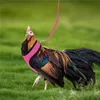If you’re thinking about bringing a wild duck into your life, it’s important to understand their biology and behavior. This article covers everything from diet and habitat to social behaviors and communication. Once you have a good understanding of your feathered friend, you can create a safe and comfortable living environment for them by providing shelter, water, food, and appropriate nesting materials. Building trust with your duck is key to establishing a strong bond, and this section offers tips such as hand-feeding, spending time together, and engaging in activities your duck enjoys. You can even train your duck in various skills and behaviors, such as coming when called or following simple commands. Finally, the article provides advice on maintaining a healthy and happy relationship with your duck over time, including grooming, health care, and mental stimulation.







Understanding Your Wild Duck
Wild ducks are fascinating creatures that can bring joy and wonder to anyone who observes them. In order to truly appreciate these feathered friends, it is important to have a basic understanding of their biology and behavior. This article aims to provide readers with insight into the lives of wild ducks, including their diet, habitat, social behaviors, and communication.
One of the first things to understand about wild ducks is their diet. These birds are omnivorous, meaning they eat both plant and animal matter. Their diet can vary depending on the species and the environment in which they live, but it typically includes aquatic plants, insects, small fish, and crustaceans. Understanding what wild ducks eat can help individuals who want to attract them to their property by providing suitable food sources.
Habitat is another important aspect of wild duck biology. Wild ducks are found in a variety of habitats, including marshes, swamps, lakes, rivers, and coastal areas. They prefer areas with ample vegetation for nesting and cover, as well as access to water for feeding and protection. Understanding the preferred habitats of wild ducks can help conservationists and wildlife enthusiasts create and protect suitable environments for these birds.
In terms of social behaviors, wild ducks are known for their strong family bonds and flocking tendencies. During the breeding season, male ducks will display elaborate courtship behaviors to attract females. Once paired, the female will find a suitable nesting site and lay her eggs. Both parents play a role in caring for the eggs and raising the ducklings once they hatch. Understanding the social behaviors of wild ducks can help people appreciate the importance of protecting their nesting sites and providing suitable environments for raising their young.
Communication is also an important aspect of wild duck behavior. These birds use a variety of vocalizations and body language to communicate with each other. For example, males may produce a distinct whistling sound during courtship displays, while females may use different calls to communicate with their ducklings. Understanding the communication methods of wild ducks can enhance the experience of observing and interacting with them in the wild.
Creating a Safe Space for Your Duck
Ducks are delightful and unique pets that bring joy and companionship to their owners. They are known for their charming quacks, amusing waddles, and graceful movements in the water. For individuals who are considering adding a duck to their family, it is crucial to create a safe and comfortable living environment for these lovely creatures. In this article, we will explore essential tips on how to provide a secure and nurturing space for your duck.
Shelter is one of the primary considerations when creating a safe space for your duck. Ducks need protection from predators, harsh weather conditions, and other potential threats. A simple yet effective shelter option for ducks is a sturdy and spacious coop or hutch. This shelter should be well-ventilated, dry, and secure to ensure the safety and well-being of your duck. Additionally, providing a cozy nesting box within the shelter will offer your duck a comfortable place to rest and lay eggs.
In addition to shelter, water is an essential element in creating a safe space for ducks. Ducks are aquatic creatures that thrive in water environments. Therefore, it is important to provide a clean and accessible water source for your duck to swim, bathe, and drink from. A shallow, wide container or kiddie pool filled with fresh water will allow your duck to engage in natural behaviors and maintain good hygiene.
Furthermore, food plays a critical role in ensuring the health and happiness of your duck. A balanced diet for ducks typically consists of commercial duck feed, fresh vegetables, grains, and occasional treats such as mealworms or fruits. Providing a consistent supply of nutritious food will contribute to your duck’s overall well-being and vitality. It is important to monitor your duck’s eating habits and adjust their diet accordingly to meet their nutritional needs.
Lastly, appropriate nesting materials are essential for creating a safe and secure space for your duck. Ducks require soft and insulating materials to line their nesting boxes and create a comfortable environment for laying and incubating eggs. Common nesting materials for ducks include straw, hay, and shredded paper. These materials not only provide comfort but also contribute to the overall cleanliness and hygiene of the nesting area.
Building Trust with Your Duck
One of the most effective ways to build trust with your duck is through hand-feeding. This technique involves feeding the ducks from your hand rather than leaving the food in their bowl. By doing so, the ducks start to associate you with positive experiences such as food, which can help them become more comfortable around you. Start by offering small pieces of food and gradually increasing the amount as the duck becomes comfortable eating from your hand. This can be a great way to establish trust without putting any pressure on the animal.
Spending time with your duck is another excellent way to establish trust. Ducks, like most animals, thrive on attention and affection. Set aside some time each day to spend with your duck, whether it is playing together or simply sitting with them. Being consistent in spending time with them can help build a connection and create a sense of security for the animal.
Engaging in activities that your duck enjoys is also essential for building trust. Observe your duck’s behavior to determine what activities they enjoy. For example, they may enjoy swimming or being brushed. By engaging in activities that they enjoy, you can build a stronger bond with your duck and show them that you care about their needs and happiness.
It is important to note that building trust with your duck does not necessarily mean treating them as pets. Instead, it is about creating a positive environment for the animal, where they feel safe and secure. This can lead to better living conditions for the animal, allowing them to live a healthier and happier life.
Training Your Duck
Ducks are friendly and intelligent animals that can be trained to follow commands and perform various tasks. With patience, dedication, and positive reinforcement, you can teach your duck useful skills that will make your relationship more enjoyable and rewarding.
Establishing Trust
Before you start training your duck, it’s essential to establish a relationship of trust and respect. Spend time with your duck every day, talking to them, feeding them, and gently handling them. Avoid making sudden movements or loud noises that may frighten them and always handle them with care.
Basic Training Methods
Once your duck trusts you, you can begin basic training methods that include teaching them to come when called or to follow simple commands. For example, you can call your duck by their name or whistle, using a consistent tone and inflection, and reward them with treats and praise when they respond correctly.
You can also use hand signals to teach your duck to follow specific commands, such as “sit,” “stay,” or “come.” Start with simple commands and gradually increase the difficulty level as your duck becomes more confident and skilled.
Positive Reinforcement
One of the most effective ways to train your duck is through positive reinforcement, which means rewarding good behavior and ignoring bad behavior. Use treats, verbal praise, and physical affection to reinforce desired behaviors, such as following commands or performing tricks.
Avoid Punishment
Avoid punishment or negative reinforcement, which means punishing bad behavior or withholding rewards. Ducks are sensitive animals that respond better to positive reinforcement than punishment. Punishing your duck may cause fear, mistrust, and stress, which can hinder their ability to learn and perform.
Practice Consistently
Consistency is key when it comes to training your duck. Practice daily, for short periods of time, and in a quiet and safe environment. Ducks have a short attention span, so keep the training sessions brief and engaging, using toys or obstacles to make the experience fun and challenging.
Maintaining Your Relationship
Wild ducks are fascinating creatures that can make for wonderful pets and companions. They are social animals that thrive on interaction with their owners, and when properly cared for, they can live long, healthy lives. However, keeping a wild duck is not as simple as just providing food and shelter. To build a strong and lasting relationship with your feathered friend, it is essential to provide proper grooming, health care, and mental stimulation.
Grooming
Grooming is an important aspect of maintaining a healthy relationship with your wild duck. Regular grooming ensures that your duck’s feathers are clean and free of parasites, which can cause discomfort and even disease. Grooming also helps to strengthen the bond between you and your duck, as it provides an opportunity for physical contact and affection.
To groom your duck, start by inspecting its feathers for dirt or debris. You can then use a soft-bristled brush or comb to gently remove any tangles or knots in their feathers. It is also important to trim your duck’s nails and beak regularly to prevent them from becoming overgrown and causing injury.
Health Care
Just like any other pet, wild ducks require regular health checkups to ensure they are in good condition. This includes vaccinations against common illnesses and regular visits to the veterinarian. It is also important to provide your duck with a nutritious diet that is rich in vitamins and minerals to keep them healthy and strong.
While many people may opt to keep their ducks in a backyard pond, it is important to note that this environment can pose certain risks to their health. Ducks that are exposed to stagnant water for prolonged periods may develop fungal infections or parasitic infestations. Providing your duck with fresh, clean water and a safe, dry place to sleep at night can help to prevent these types of issues.
Mental Stimulation
Wild ducks are intelligent animals that require mental stimulation to stay happy and engaged. Without opportunities to explore and interact with their surroundings, they can become bored and even depressed. To keep your duck mentally stimulated, consider providing them with toys or puzzles that encourage exploration and problem-solving.
In addition, spending time with your duck every day can go a long way towards building a strong and lasting relationship. Take them for walks outdoors, play games together, or simply spend time cuddling and showing them affection. These activities not only provide mental stimulation but also help to strengthen the bond between you and your feathered friend.
Conclusion
Keeping a wild duck as a pet can be a rewarding experience, but it requires dedication and commitment. By providing proper grooming, health care, and mental stimulation, you can build a strong and healthy relationship with your feathered companion that will last for years to come. Whether you are a new duck owner or have been caring for your feathered friend for years, taking the time to maintain your relationship is essential to ensuring their happiness and well-being.
FAQ
Q1. What is the best way to start bonding with a wild duck?
The first step in bonding with a wild duck is to gain trust and establish a relationship. You can start by offering food to the duck, either by hand or by leaving it in a designated area. Consistency is key in establishing trust, so make sure to offer food at around the same time every day. Once the duck becomes comfortable with your presence, you can gradually move closer to them, talk to them calmly, and even try petting them gently. It’s important to note that every duck is unique, so patience and respect are necessary in building a positive connection.
Q2. Are there any risks involved in attempting to train a wild duck?
Training a wild duck can be a rewarding experience, but it’s important to keep in mind that they are still wild animals. There is always a risk of injury to both the duck and the handler, especially if the duck becomes agitated or frightened. It’s important to approach training with caution and always prioritize the safety of yourself and the duck. Additionally, it’s essential to ensure that the duck has access to proper nutrition, shelter, and clean water.
Q3. How can I train my wild duck to follow commands?
Training a wild duck to follow commands requires patience and consistency. You can start by teaching simple commands such as “come” or “stay” using positive reinforcement techniques like treats or affection. Repetition is key in reinforcing the behavior you want to encourage. It’s crucial to avoid punishing the duck for not following directions, as this can cause fear and aggression. Instead, focus on rewarding the desired behavior and gradually increasing the complexity of the commands. It’s also important to remember that ducks have their own personalities and may not respond to training in the same way that other domesticated animals do.
Q4. Can I keep a wild duck as a pet?
Wild ducks are protected under state and federal laws, and it is generally illegal to keep them as pets. However, domesticated ducks can make great pets and can be easily trained and socialized. If you are interested in keeping ducks as pets, consider adopting from a reputable organization or breeder who specializes in domesticated ducks. Make sure to provide them with adequate space, proper nutrition, and veterinary care to ensure their health and happiness.

